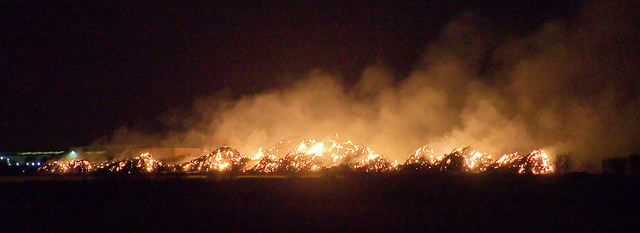FWP:
SETS == PARALLELISM
FLAME/STRAW: {21,5}
As so often, we must decide without help from the verse itself how to connect the two lines. Does line two merely provide a metaphorical illustration for line one, so that they describe the same situation? Or do the two lines operate independently, linked only as two examples of what the lover did? The verse shows a certain parallelism of structure (on this see {22,5}), though not the maximum possible amount.
If line two is taken as simply elaborating on line one, then the complexities of line one become significant. Is the speaker's knowledge accurate, so that his weakness is a reliable indicator of the beloved's ill-temper (1a)? Or is it the cowardice and hesitation induced by his weakness that causes the speaker to fearfully impute to her bad temper what are really his own deficiencies (1b)? The verb jaan'naa, although it's usually translated 'to know', can also be used for erroneous beliefs; see {34,8} for an example.
Nazm's reading of (1b) causes him to read line two as an equally erroneous statement-- the speaker is foolish enough to make a wild misjudgement, which is revealed as folly by the absurdity of the metaphorical parallel offered for it: 'As if the heat of the flame can be learned from the pulse of the straw!'
But it's also worth noting the elegance of (1a). This reading implies that the beloved is at the core of the speaker's being: he is able to know about the beloved's temperament through his own physical state, just the way he is able to know about his own heart through his physical state (since of course the beloved is in his heart, controls his heart, owns his heart, etc.) Why should such information necessarily be erroneous? (See {25,3} for another case in which the beloved seems to have penetrated deeply into the lover's psyche.) On the same grounds, perhaps the pulse of the straw as it quivers and begins to crackle is indeed an accurate measure of the heat of the flame, since the fire is at its heart. After all, in many medical traditions, including Indic and Islamic ones, the examination of the patient's pulse has been treated as a significant diagnostic tool.
Note for grammar fans: The form of hogaa makes it either
a future tense, so that the beloved's behavior at some future time is being forecast (1a);
or else a presumptive, so that the beloved's present behavior is being guessed
at or estimated from a distance (1b).

Nazm:
He has envisioned weakness as straw, and ill-temper as flame, and used for straw the simile of a vein with a pulse.... This verse should be read in a tone of sarcasm and reproach. The poet blames himself: 'Due to my weakness and incapacity, I considered that she must be ill-natured and bad-tempered. I should avoid this. As if the heat of the flame can be learned from the pulse of the straw!' (33)
== Nazm page 33